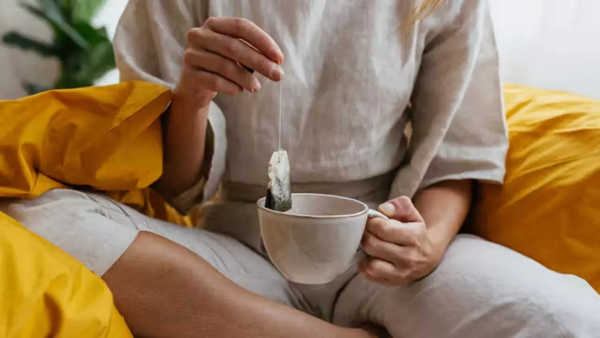
Picture this: you roll out of bed, shuffle to the kettle, and pour yourself a steaming cup of “bed tea” before breakfast. Cozy, right? Well… hold up!
Yes, we know! Bed tea is one of the most popular morning rituals for several reasons – it’s a warm and comfortable wake-up call, it allows you the time to sit with yourself and plan your day, lets you take in the morning tranquility, and more than anything – it’s extremely ‘grammable! And to be honest, there’s nothing wrong with enjoying a lovely cup of tea.
But as comforting as that ritual may feel, reaching for tea on an empty stomach can spark a cascade of unwanted ripple effects.

Here are 7 reasons why that soothing cup might actually be sabotaging your morning mojo. Let’s dive in.
Acidity and stomach discomfort
Tea (especially black and green varieties) contains caffeine and tannins, which are fantastic for boosting our mood and alertness. But here's the catch: these compounds can ramp up stomach acid production. On an empty stomach, this elevated acidity might lead to irritation of the stomach lining. You might find yourself dealing with heartburn, cramps, bloating, or even a wave of nausea. If this happens frequently, it could have more lasting effects, contributing to concerns like gastritis or even ulcers over time. So, it’s wise to consider having a light snack before your tea to minimize the risk of discomfort!
Nausea (thanks, Tannins)
Speaking of tannins, these bitter polyphenols found in tea can be a double-edged sword. For some, drinking tea on an empty stomach can lead to feelings of nausea or, in some unfortunate cases, even vomiting. It’s a common issue that many tea enthusiasts
face! To avoid such unpleasant experiences, consider brewing your tea at a lower temperature or opting for a milder brew. Some people also recommend “lining the stomach” with a little food beforehand to help ease any potential queasiness.
Dehydration alert
After a long night’s sleep, our bodies often wake up craving hydration. However, tea has a mild diuretic effect, which means it might make you urinate more frequently, potentially exacerbating dehydration if you’re not careful. This can lead to headaches, lightheadedness, and muscle cramps, leaving you feeling less than your best. Staying mindful of your water intake alongside your tea can help keep you feeling refreshed.

Nutrient absorption blocker
It’s fascinating (and a bit concerning) to note that tannins can interfere with the absorption of essential nutrients like iron and calcium. This interaction can subtly contribute to conditions such as iron deficiency anemia, particularly for those relying heavily on plant-based diets or cereal breakfasts. If tea is a regular part of your morning routine, it might be worth timing it away from your meals or snacks that are rich in these vital minerals.
Oral health wear‑and‑tear
We often overlook how our favorite beverages can impact oral health. Tea's acidic nature, combined with the bacteria naturally present in our mouths, may erode tooth enamel. This erosion can lead to increased sensitivity and a higher risk of cavities. And if you enjoy adding sugar to your tea, that can further compound the issue. Remember, keeping up with good dental hygiene and regular check-ups can help protect your smile!
Metabolism and hormone misfire
The caffeine kick you get from your morning cup can interfere with your body’s natural cortisol rhythm. This disruption might leave your energy levels feeling more erratic than stable. Additionally, the impact of tea on gut bacteria can alter your metabolic balance, which may influence digestion and how well your body absorbs nutrients. It’s a good idea to listen to your body and maybe even explore herbal teas that tend to be gentler on the stomach.
Jitters, anxiety, and palpitations
For those who are sensitive to caffeine, sipping tea on an empty stomach may lead to heightened feelings of anxiety, jitters, or even palpitations. Since caffeine absorbs quickly when there’s no food in your stomach, you might experience rapid spikes in heart rate and blood pressure. Tannins can cloud your mental clarity, leaving you feeling jittery and unfocused. If you’ve ever experienced that unsettled feeling after your morning cup, you’re not alone!

Morning tea ritual – reimagined!
Tea truly deserves its reputation as a calming, healthful, ritual-rich beverage. But bed tea – that unbuffered, empty-stomach version – is a recipe for irritation, discomfort, and more serious health hits if it becomes habit. So, what should we do instead?
Eat before tea! Even a slice of toast, banana, or yogurt can buffer your stomach and slow caffeine absorption, reducing all of the above complaints. Hydrate yourself and drink a glass of water before tea to rehydrate after sleep. Choose gentler teas, especially for the morning tea. Herbal blends like chamomile, rooibos, or peppermint are caffeine-free and less acidic, won’t irritate or dehydrate.
Most importantly, time it right. Mid‑morning tea, after breakfast, is ideal. Your metabolism and stomach are “online” and ready!



